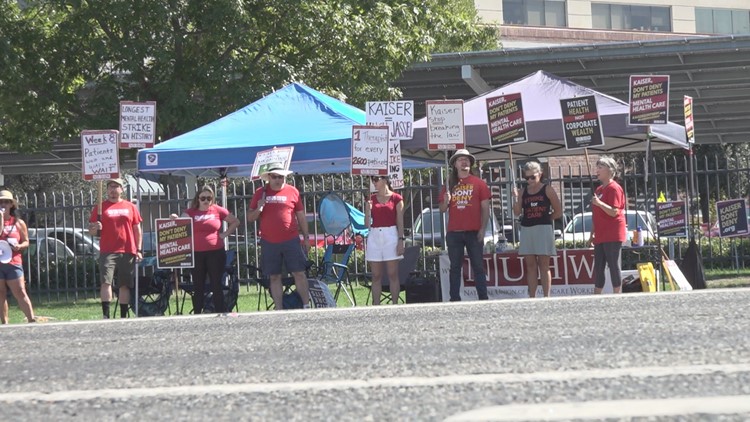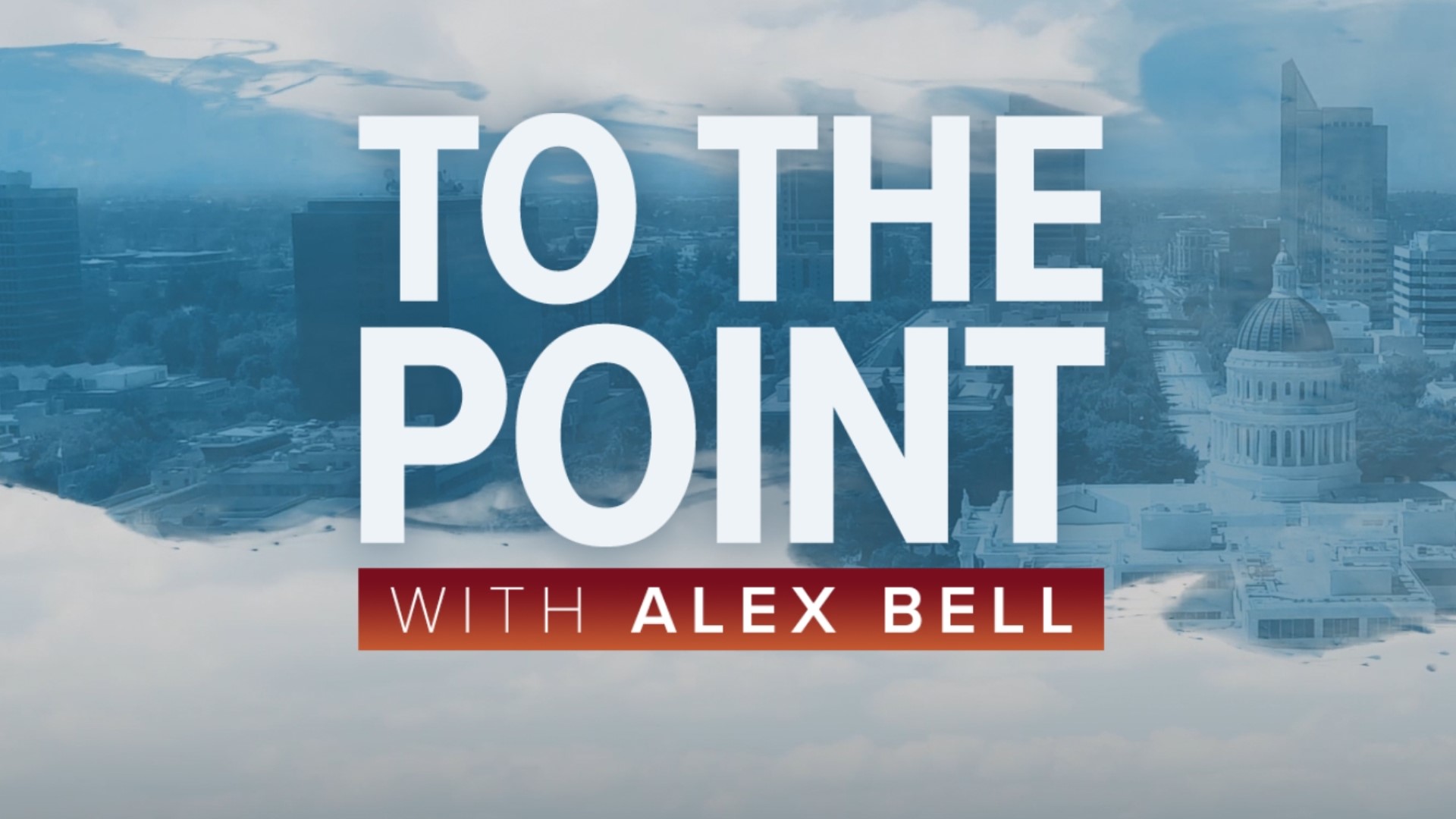SACRAMENTO, Calif. — Monday marks the start of week nine of a strike by Kaiser Permanente mental healthcare providers.
The National Union of Healthcare Workers represents just over 2,000 psychologists, social workers, therapists, and chemical dependency counselors in Kaiser's Northern California region, which includes the Sacramento area, Central Valley, and Bay Area.
Hundreds of them remain on strike – which began Aug. 15. They tell ABC10 it’s not about the money but about the time Kaiser Permanente gives them to provide quality care to patients.
They’re demanding three main things they say will lead to better patient care:
• A caseload cap. Currently, they say, there’s no limit on how many patients a provider can have at one time, and the union calls caseloads “unmanageable.”
• More ‘returning patient’ appointments and fewer ‘new patient’ appointments, to have more availability for existing patients
• And more time for ‘Indirect Patient Care.’ That’s the time a provider spends outside of seeing patients.
Jenny Butera is a general outpatient therapist for the adult psychiatry department. ABC10 spoke with her on the strike line last week.
“Indirect care is actually tasks that we need to do to provide for the patient,” Butera said. “Oftentimes, that might be calling the sheriff for a welfare check, doing a 5150 on a suicidal patient, contacting CPS for reporting a child abuse case. So a lot of things that are only possible if you're licensed therapist, and it's not just charting - but that is part of it, too.”
Indirect Patient Care Time also includes replying to patient emails and creating treatment plans, an NUHW spokesperson said.
Kaiser Permanente says they’ve met the NUHW halfway at the bargaining table on Indirect Patient Care Time, only to have their offers rejected.
“The union’s excessive demand would reduce the number of appointments we currently have by more than 2,500 every week,” Kaiser Permanente told ABC10 in a statement. “This takes us in the wrong direction, at a time when the need for mental health care has never been higher. Kaiser Permanente has been clear we are not willing to do that. We have extended all that we can without jeopardizing the care we bring to patients.”
Kaiser added it plans on adding "a framework to provide practice support that will dramatically free up therapists’ time by having administrative and clinical professionals, including psychiatric techs, take care of administrative-related tasks and other work that does not require a licensed therapist. This means freeing up more of their indirect time – we estimate this could be as much as 30-45 minutes per day.”
In terms of caseload, Kaiser said, “Our therapists in adult and child mental health clinics who provide individual psychotherapy see an average of 5 to 7 patients per day. In addition, we have an administrative structure in place to ensure an appropriate amount of preparation time and time to support ongoing education.”
Butera said — it’s about quality over quantity.
“Patients are suffering, and they will continue to suffer with our current caseload and our current schedule, the way it's made up,” she said.
Also at the heart of this is a law called SB221, which went into effect on July 1 of this year. It aims to strengthen Californians’ timely access to mental healthcare by requiring healthcare service plans – including Kaiser Permanente – and health insurers to provide follow-up mental health and substance use disorder therapy appointments within 10 business days unless the therapist decides the patient can wait longer.
“Not all patients need that time or need that frequent of a session, but many do, and we just can’t get them in,” Butera said. “Some therapists have some availability in four weeks. I certainly don't. My earliest is typically six- to eight weeks out.”
The union claims Kaiser is violating SB221, especially with hundreds of providers still out on strike.
Responding to that claim, Kaiser Permanente told ABC10, “The new law aligns with Kaiser Permanente’s long-standing commitment to provide timely, high-quality mental health care and substance use disorder treatment to our members. The implementation of SB 221 is challenging for all health plans and providers, not just Kaiser Permanente, given the overall demand for mental health care and substance use disorder services and the documented shortage of trained professionals both nationally and in California. Implementation of (SB) 221 to Kaiser Permanente’s model of mental health and addiction care and services is well underway.”
ABC10 reached out to Richard Frank, a Senior Fellow in Economic Studies with the Brookings Institution and Director of the USC-Brookings Schaeffer Initiative on Health Policy. He said the aim of SB221 is a good one — trying to make mental healthcare as accessible as physical healthcare.
“The 10-day rule seems to be pretty reasonable,” he said. “What we're really interested in, is making sure that people can get quality mental health and substance use disorder services when they need it at a reasonable quality.”
How many patients are affected by the NUHW strike?
It’s hard to quantify. Kaiser said it is working with patients whose providers are on strike and offering them the option to meet with a contracted community-based provider.
Kaiser also said 65% of the providers who initially went on strike back in August have since returned to work.
On the other hand, the NUHW said patients are affected by having to wait weeks to schedule follow-up appointments with their provider – a problem even before the strike, but now the union says that’s a violation of SB221, which – again - went into effect July 1 and requires mental health follow-up appointments to be made available within 10 business day of the previous appointment, for those whose providers decide it’s needed.
What about a provider shortage?
Yes, studies have shown California faces a mental healthcare provider shortage amid a massive increase in demand, but how acutely that’s felt depends in part on where you live. Generally, urban areas have a higher concentration of providers than rural areas.
The union contends that the working conditions at Kaiser Permanente - with it says are high caseloads and an insufficient amount of Indirect Patient Care Time - are leading to high turnover, so it’s not about provider shortage so much as providers seeking employment outside of Kaiser.
Are the two sides close to an agreement?
Bargaining continued on Monday, but NUHW said “no news to report on it.”
Ongoing issues
Kaiser patient Maya Polon, of Sacramento, sought mental healthcare in early 2021 and described the process as convoluted and stressful.
As part of the process, she told ABC10, Kaiser referred her to an outside provider, "because the wait within Kaiser would be at least eight weeks to do intake with a new therapist and then another eight weeks to schedule that first appointment, which just wasn't something that could work for me.”
So she said Kaiser gave her a list of 10 external therapists.
“I called through every single therapist and none of them were seeing new patients. Half of them had retired, despite Kaiser saying that these were people who were seeing new patients. From there, I got another list of 10 people. The last person on the list was able to see me but not through the referral type I had, so I spent six months trying to get Kaiser to give me the correct referral type," Polon said.
They eventually got it worked out and Kaiser reimbursed the provider, Polon said, but it was a long and stressful process.
This is the kind of experience Mary Watanabe, Director of the California Department of Managed Health Care (DMHC), says is unacceptable. The DMHC oversees health plans, including Kaiser Permanente.
"It is not our expectation that a consumer who's having a mental health crisis is going to call 50 providers, whether that's in- or out of Kaiser to find an appointment. That's the health plan's responsibility," Watanabe told state senators an August hearing of the Senate Select Committee on Mental Health and Addiction.
This hearing was just days before mental healthcare providers at Kaiser were set to strike across Northern California, so committee members were asking about Kaiser’s ability to provide timely access to mental healthcare.
"We have enough information to indicate that there is a problem with access to care of behavioral health services at Kaiser," Watanabe testified. "From 2020 to 2021, we also saw a 20% increase in complaints to our Help Center, from Kaiser enrollees."
She said the DMHC has launched a special audit of Kaiser, specific to timely access to mental healthcare.
However, this is an ongoing problem the DMHC has been following for years.
In this routine audit of Kaiser conducted in 2012 and published in 2013, the DMHC found Kaiser wasn’t ensuring timely mental healthcare appointments or tracking which contracted providers were available. It wasn’t fixing issues quickly enough and not offering patients enough information on how to best access mental healthcare, the report found.
The findings resulted in a $4 million fine, which Kaiser ultimately paid.
But subsequent reports found many of the problems went uncorrected, documenting ongoing issues with timely access to mental healthcare.
Meanwhile, Polon pointed out she gets great physical healthcare through Kaiser.
"When I want to see a doctor, a dermatologist, my primary care [provider], whatever that may be, I can see them within a week, which is really, really amazing," Polon said. "But to have to go through this entire really stressful process, really anxiety-inducing process, and then have to wait that long to be seen by a provider...is just absolutely, like, shocking and horrifying."
How will the DMHC ensure health plans follow SB221?
Watanabe said the DMHC is monitoring compliance with SB221 in several ways, including a Help Center hotline, where they’re collecting consumer complaints about long wait times between appointments.
ABC10 asked how many complaints the DMHC has received since SB221 went into effect.
"The DMHC Help Center has received 126 complaints against Kaiser through October 1, and no complaints against other health plans, related to this requirement that took effect on July 1, 2022," a DMHC spokesperson told ABC10.
The DMHC also conducts audits of health plans every three years and require the plans to submit an annual report on whether they’re meeting timely access standards—a list of benchmarks that will now include mental health follow-up appointments within 10 business days, per SB221.





















